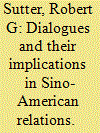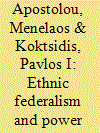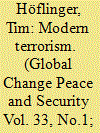|
|
|
Sort Order |
|
|
|
Items / Page
|
|
|
|
|
|
|
| Srl | Item |
| 1 |
ID:
124072


|
|
|
|
|
| Publication |
2013.
|
| Summary/Abstract |
This article briefly reviews the role exchanges and dialogues have played in U.S.-China relations since President Nixon's visit to China in 1972, and examines in more detail the process, significance and outlook of recent dialogues. The overall record of dialogues shows that they are important instruments in the policy "tool kit" of each side to deal with salient areas of common interests and disagreement that have broadened in scope as a result of China's rising international importance and the increasing salience of an ever wider range of issues in U.S.-Chinese relations in the 21st century. Both sides view these policy instruments positively; they serve as shock absorbers in periods of difficulty, provide the basis for actual or potential channels of informal communication in times of crisis, and promote efforts to broaden common ground in U.S.-Chinese relations. The checkered record of military exchanges is among the array of evidence showing the reality that dialogues are subservient to the respective interests of the leaders on either side. Dialogues are instruments of improved relations but they do not compel improvement, which at bottom is decided by policy elites in Beijing and Washington. After forty years of efforts to normalize U.S.-China relations, those elites cooperate closely on a wide range of issues but also reflect wariness toward one another that underlines important diverging interests and differences dividing the two powers.
|
|
|
|
|
|
|
|
|
|
|
|
|
|
|
|
| 2 |
ID:
148651


|
|
|
|
|
| Summary/Abstract |
Negotiations for the settlement of the Cyprus question have resumed amid a pressing geopolitical and economic reality. Greek and Turkish Cypriots adopt distinct interpretations of the United Nations – designated recipe for a bicommunal and bizonal federation in Cyprus. In the relative absence of major normative preconditions for settlement, including a lack of common vision and mutual trust, the pillar notions of federalism and consociationalism have been adapted to serve each side’s vital security concerns and to increase each side’s leverage in a future federal arrangement in Cyprus. This study conducted an opinion poll of young, educated Greek Cypriots to identify the preferred type of constitutional settlement in the context of a number of perceived motives, constraints, and preconditions. The findings of this survey reveal substantial consensus on the acceptance of a bizonal, bicommunal solution. Yet acceptance of a federal solution is subject to certain prerequisites. The study reveals the varying influence of current economic concerns on a prospective solution.
|
|
|
|
|
|
|
|
|
|
|
|
|
|
|
|
| 3 |
ID:
177549


|
|
|
|
|
| Summary/Abstract |
In most cases, terrorism must be considered as an outcome of both individual motives and strategic considerations on an organisational or group level. Whether the (strategic) intentions of a group or individual motives constitute the main driver varies with the different sources of motivation behind terrorism. The robustness and consistency of proclaimed political agendas of terror groups differ significantly and, therefore, also their ‘strategic’ use of terrorism. Overall, one can argue that today groups represent the main drivers behind global terrorism as they account for the vast majority of attacks and casualties. However, one can also identify a growing blurring of boundaries between the actions of terror organisations and independently acting terrorists facilitated through modern communication technology.
|
|
|
|
|
|
|
|
|
|
|
|
|
|
|
|
| 4 |
ID:
158445


|
|
|
|
|
| Summary/Abstract |
This paper investigates what motivates young people to volunteer for peace-keeping or peace-enforcing missions and how their motives change between pre- and post-deployment. Data include information about social and military background, and motives for more than 600 soldiers, 444 of whom answered the survey both before and after deployment. Soldiers are deployed to different missions under the same circumstances. To conceptualize motives among soldiers, we use factor analysis and find three factors: challenge, self-benefit, and fidelity. Challenge represents an occupational orientation; fidelity, an institutional orientation; and self-benefit, a desire for adventure. Exploiting the within-subject design of our data, we find that pre- and post-deployment motives vary significantly according to the type of mission and soldiers’ previous experiences (first-timers or experienced soldiers). Our results suggest that after the mission, peace-keepers are generally more disappointed than peace-enforcers. Our results also show that self-benefit motives are important for younger soldiers with only a high school education, and that this group usually serves as peace-enforcers during their gap year.
|
|
|
|
|
|
|
|
|
|
|
|
|
|
|
|
|
|
|
|
|